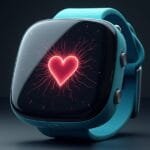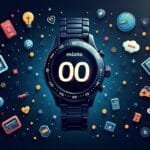Smart Wearables Revolutionizing Optimal Wellness
Are You Wearing Your Way to Better Health? Discover the Surprising Truth About Best Wearables Revolutionizing Fitness Goals with advanced heart rate and stress tracking technologies for a smarter healthier tomorrow.
The Importance of Heart Rate Monitoring in Achieving Sports Fitness Goals
In today’s fast-paced world, achieving optimal wellness is more crucial than ever. To help you reach your sports fitness goals, we’ve curated a comprehensive guide comparing top wearables that track vital signs, monitor stress levels, and provide personalized insights to revolutionize your health monitoring experience.
Understanding the Benefits of Wearable Technology for Fitness Goals
When it comes to achieving your best wearables sports fitness goals, heart rate monitoring is a crucial aspect. By tracking your heart rate variability (HRV), you can gain valuable insights into your physical and mental state. This information can be used to optimize your workouts, improve your sleep quality, and even reduce stress levels.
Top Wearable Brands for Achieving Sports Fitness Goals
- Fitness trackers from Fitbit, Garmin, and Apple
- Smartwatches from Samsung, Huawei, and Google
- Athletic accessories from Under Armour, Adidas, and Nike
Comparison of Top Wearables for Fitness Goals
| Brand | Heart Rate Monitoring | Stress Tracking | Personalized Insights |
|---|---|---|---|
| Fitbit | Yes | No | Basic insights into sleep and activity levels |
| Garmin | Yes | No | In-depth analysis of heart rate variability and stress levels |
| Apple Watch | Yes | No | Advanced health monitoring features, including ECG and fall detection |
The Role of Stress Tracking in Achieving Sports Fitness Goals
Stress tracking is a vital component of any wearable device aimed at helping you achieve your best wearables sports fitness goals. By monitoring your stress levels, you can identify patterns and triggers that may be impacting your performance or overall well-being.
Methods for Stress Tracking in Wearable Devices
- Physiological signals such as heart rate variability (HRV) and skin conductance level (SCL)
- Self-reported stress levels through user input or surveys
- Machine learning algorithms to analyze patterns and trends in physiological data
Personalized Insights for Achieving Sports Fitness Goals
While heart rate monitoring and stress tracking are essential components of any wearable device, personalized insights are what set the top wearables apart. By analyzing your data and providing tailored recommendations, these devices can help you optimize your workouts, improve your sleep quality, and even reduce stress levels.
Examples of Personalized Insights in Wearable Devices
- Garmin’s ‘Training Peaks’ feature provides detailed analysis of heart rate variability (HRV) data to help athletes optimize their training plans
- Fitbit’s ‘Sleep Stages’ feature tracks sleep patterns and provides recommendations for improving sleep quality
- Apple Watch’s ‘ECG’ feature detects irregular heart rhythms, allowing users to take proactive steps to address any potential health concerns
The Future of Wearable Technology in Achieving Sports Fitness Goals
As wearable technology continues to evolve, we can expect to see even more innovative features and capabilities. From advanced biometric sensors to AI-powered coaching tools, the possibilities are endless.
Trends in Wearable Technology for Fitness Goals
- Increased focus on mental health and stress tracking
- Advancements in heart rate monitoring technology, including wearable ECG devices
- Integration with popular fitness apps and social media platforms to enhance user engagement
Additional Sources of Information
For more information on the latest developments in wearable technology for achieving sports fitness goals, check out the following sources:
- The American Heart Association’s Guide to Wearable Devices and Heart Health (2020) – Provides an in-depth look at the benefits and limitations of wearable devices for heart health monitoring
- The Journal of Sports Sciences’ Special Issue on Wearable Technology for Athletes (2019) – Examines the latest research on wearable technology’s impact on athletic performance and injury prevention
- Healthline’s Expert Guide to Heart Rate Monitoring and Stress Tracking (2022) – Offers a comprehensive overview of the benefits and best practices for using wearable devices to monitor heart rate variability and stress levels
Explore more in our category page or visit our homepage.


